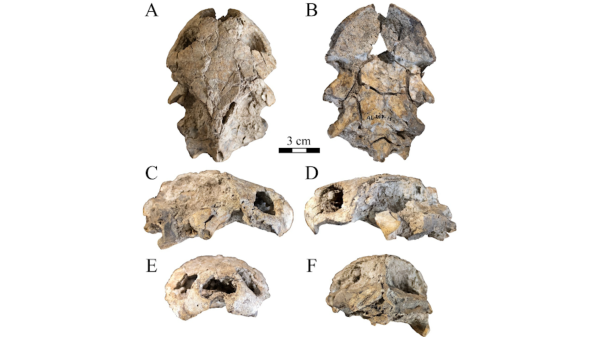New research links low choline levels in blood to Alzheimer's disease progression

Two classic hallmarks of Alzheimer's disease are known as plaques and tangles. Plaques, dense accumulations of a protein known as amyloid beta, form in the spaces between nerve cells. Tangles, on the other hand, are found within the cell bodies of affected neurons and are formed from another important protein known as tau. The new research describes a strong association between low blood choline and higher accumulations of both amyloid plaques and tau tangles. Image courtesy Shutterstock
Have you considered your choline level lately? This essential nutrient is vital for neurological health as well as liver and metabolic function, and about 90% of Americans are deficient in it.
In a new study, senior author Ramon Velazquez, first author and ASU Edson Postdoctoral Fellow Jessica Judd and their colleagues at the ASU School of Molecular Sciences and the Banner Brain and Body Donation Center present evidence that low levels of choline in the bloodstream are associated with increased severity of Alzheimer's disease pathology in the brain.
The research shows that, compared with healthy individuals, patients with Alzheimer’s disease have reduced circulating choline and its derivative acetylcholine. Levels were lowest in those with the most severe pathology.
The researchers analyzed blood samples from Alzheimer’s disease patients representing a spectrum of disease progression, as well as patients with mild cognitive impairment, an early stage where memory or other cognitive abilities are mildly affected. In all groups, lower choline correlated with more extensive brain pathology, suggesting that blood choline could potentially serve as an indicator of disease severity and progression.
The findings highlight strong associations between low blood choline and higher accumulations of both amyloid plaques and tau tangles — two classic hallmarks of Alzheimer's disease. Additionally, the work finds that low choline levels were associated with increased levels of a key marker of inflammation known as TNF-alpha.
Further, the research offers hope that supplying sufficient choline may help to protect the brain from Alzheimer’s disease, or at least delay the onset of symptoms of Alzheimer's and other neurodegenerative diseases.
“Given that 90% of Americans are not receiving adequate daily choline intake, in addition to recent evidence linking dietary choline deficiency to Alzheimer’s incidence and our physiological findings here — (the research) collectively highlights the importance of ensuring adequate choline intake to offset disease,” said Ramon Velazquez, who is an assistant professor with the ASU-Banner Neurodegenerative Disease Research Center and ASU's School of Life Sciences.
The research appears in the current issue of the journal Acta Neuropathologica.
Ramon Velazquez
A tidal wave approaches
Alzheimer's disease casts a growing shadow over an aging population. The insidious illness touches millions of lives, depriving sufferers of their memories, independence and sense of self. But beyond the devastating personal toll, the sheer scale of Alzheimer's presents a looming public health crisis.
Already, more than six million Americans are living with Alzheimer's. This figure could nearly triple to 14 million by 2050 as baby boomers advance in age. Worldwide, nearly 50 million people suffer from dementia — with projections exceeding 130 million in the coming decades.
Alzheimer's progresses gradually, but the effects are profound. Mild forgetfulness advances to difficulty following conversations, remembering names and recalling recent events. Later stages bring severe disorientation, personality changes and, ultimately, a complete loss of independence. Patients require round-the-clock care.
The statistics are daunting and underscore the vital need for research toward treatment and prevention.
Hazards of low choline
Alzheimer’s is a disease with many root causes, from genetic to environmental. While the illness is commonly associated with advanced age, it is now believed that the cataclysmic changes inflicted on the brain begin stealthily, many decades before the disease is clinically detectable. As the new study emphasizes, dietary factors also play an underappreciated role.
Choline is a naturally occurring nutrient found in foods including eggs, broccoli, beans, meat and poultry. Yet research suggests that most are not getting the minimum recommended amount from their diet. Moreover, current Institute of Medicine recommendations may underestimate how much choline is required for optimal brain health.
The study analyzes blood samples from Alzheimer’s patients at different disease stages, including mild cognitive impairment, an early stage where memory or other cognitive abilities are affected. Across all groups, lower choline corresponded with higher neuropathology.
A common, standardized test of cognitive function, known as the Mini-Mental State Examination, was used to provide a quantitative assessment of cognitive changes related to Alzheimer’s disease progression over time in the study participants.
Jessica Judd
In the Alzheimer’s disease patients, the alterations associated with choline were dramatic. Higher serum choline levels were associated with higher cognitive test scores. Conversely, low choline levels were associated with increased levels of a key marker of inflammation known as TNF-alpha, as well as lower scores, indicating reduced cognition.
Mouse models confirm choline’s impact
In addition to exploring choline levels in human blood samples, the researchers evaluated the effects of dietary choline deficiency and supplementation in mouse models of Alzheimer’s disease. Mice fed a choline-deficient diet exhibited elevated Alzheimer’s-associated pathologies in their brains and reduced circulating choline, mirroring the effects seen in human cases. In contrast, mice receiving choline supplementation showed reduced Alzheimer’s-related brain changes.
The transformations observed in the mouse models closely parallel the findings in human patients, further strengthening the case for choline’s importance for mitigating Alzheimer’s disease. While dietary choline intake may not be able to reduce plaques or tangles in advanced stages of disease, sufficient choline is critical for proper body and brain function throughout adulthood and may act to dampen the progression of the illness.
The results provide promising indications that choline is an essential and neglected ingredient for brain and body health that may help stave off the progression of neurodegenerative disorders, including Alzheimer’s disease. As for the benefits of choline supplementation above the recommended daily intake amounts, clinical trials will be required to establish optimal choline guidelines for cognitive benefits at different life stages and determine if choline supplements meaningfully impact Alzheimer’s.
Periodic monitoring of choline levels during the aging process may also provide clinicians with an additional window into brain health and guide therapeutic efforts.
"Years of published work on dietary choline intake, in addition to this recent publication, truly highlight the importance of adequate choline for proper brain health,” Judd says.
Velazquez concludes by saying: “It is our hope that this work raises awareness on the importance of dietary choline intake, allowing for widespread deficiencies seen in our population to be reduced, thereby offsetting disease occurrence for the general population.”
More Science and technology

When facts aren’t enough
In the age of viral headlines and endless scrolling, misinformation travels faster than the truth. Even careful readers can be…

Scientists discover new turtle that lived alongside 'Lucy' species
Shell pieces and a rare skull of a 3-million-year-old freshwater turtle are providing scientists at Arizona State University with…

ASU named one of the world’s top universities for interdisciplinary science
Arizona State University has an ambitious goal: to become the world’s leading global center for interdisciplinary research,…

